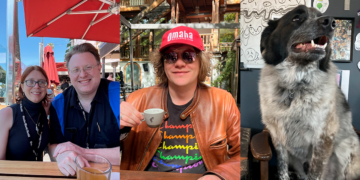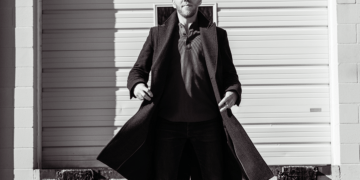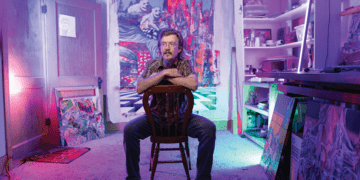As of August 2023, Redfin, the popular online home search tool, reports that the number of homes sold in Nebraska fell 11.4% during the last year, the number of homes for sale fell 12.1%, and the average cost of a home in Omaha sits at $275,000, up 5.8% from last year.
If you’re a renter, the trends are similar. Realtor.com estimates that the average rent increase in 2023 will be about 3% nationally, about half of what it grew in 2022.
While it is apparent that housing costs are pinching wallets across the economic spectrum, for the 44% of Nebraska households that can be described as “housing insecure,” which means that more than 30% of household income is spent on housing, these trends are a very real push towards a cliff’s edge that overlooks reduced economic mobility, negative health impacts, and even displacement.
Omaha, however, has an archipelago of institutions working to provide creative solutions for the mounting affordable housing crisis, many of which are led by women.
Joanie Poore and the Omaha Housing Authority
The Omaha Housing Authority is one of these institutions and a lynchpin at that. The OHA is on a mission to alleviate the housing crisis by offering not just public housing, but vouchers and a range of choices that empower individuals as well. OHA’s commitment to addressing this issue is evident in its portfolio. The organization owns and operates 1,600 housing units and provides 5,000 vouchers to those in need. These vouchers are a lifeline for many, bridging the gap between aspiration and reality and enabling recipients to secure housing that meets their needs.
Joanie Poore, the CEO of the OHA, highlights ongoing efforts to expand options for citizens in need. One noteworthy expansion involves the foray into mixed-income housing options. By creating such communities, OHA is fostering an inclusive environment where individuals from various socioeconomic backgrounds can live side-by-side. These mixed-income communities, along with other projects and partnerships, including ones with Brinshore Development and Seventy Five North, exemplify OHA’s commitment to innovative solutions.
The work to help people find housing is personal for Poore. As a child, she experienced economic difficulty when her father, who worked at a packing house, suffered a back injury and was unable to work. Around the same time, her mother underwent a battle with non-Hodgkins lymphoma.
“We had to visit a food pantry and maybe only had one pair of shoes, but we had a home,” Poore said. “Without grandparents, my family could have very easily been without a place to live. While I didn’t have the experience of being evicted, I understand the importance of working to help people receive this basic human right. Whether it’s public housing or market-rate housing, people need a place to call home.”
InCommon and Rachel Bahl
Another entity dedicated to ameliorating the affordable housing crisis in Omaha is inCOMMON. The organization’s mission is to “alleviate poverty at a root level by uniting and strengthening neighborhoods,” which it does through a myriad of programs that impact all levels of a community. “We believe that your zip code should not determine what the rest of your life looks like,” explained the organnization’s co-director, Rachel Bahl.
Many who work for inCommon don’t just punch a clock and go to work; Bahl, for example, walks the walk. She lives in Park Avenue, a neighborhood inCOMMON supports. “These aren’t clients, they are my actual neighbors…When we begin work, we want to ask, ‘Does taking on this project help my neighbor? Is this going to benefit the people I know?’”
The nonprofit provides an array of programs, ranging from GED and citizenship classes, to homebuyer education programs, and even neighborhood leadership development. “We really believe that neighborhood transformation should come from neighborhoods themselves,” Bahl explained.
inCOMMON also works specifically to combat the affordable housing crisis. “Around 2015, we started to realize that rents were increasing in the neighborhoods we worked in, and many couldn’t afford home ownership,” Bahl said. “inCommon went forward and purchased an apartment complex in Park Avenue, and the next year, purchased another. The goal is to address affordable housing needs for as many as we can for those who qualify financially.”
In the end, the goal is dignity. “We believe that people should be able to live with dignity,” Bahl explained. “There should be no differentiators between quality of life for those in market-rate housing and those who rent.”
Omaha Municipal Land Bank and Leslie Smith
While land banks have been around since the 1920s, they were re-embraced as a tool for community reformation after the waves of foreclosures that followed the 2007 financial crisis. When done right, land banks can become powerful forces for revitalizing areas of cities that need non-traditional development tools. The Omaha Municipal Land Bank, headed by executive director Leslie Smith, is one such force.
Smith is a Nebraskan by choice. Although she is, in her own words, “Mississippi born and Memphis groomed,” she is now devoted to Omaha. She first worked in Memphis local government, where she did community advocacy work. Then she helped to get the land bank in Memphis operational. After that, she gained national experience working for Truist Bank, where, among other things, she was responsible for analysis on expanding lending opportunities. Her passion and experience for creating economically healthy communities has brought her to Omaha, where she is committed to kindling economic opportunity in regards to housing.
The OMLB is a nonprofit entity that takes abandoned or vacant properties and works to revitalize them. This not only helps to restore a city’s tax base in a way that is transparent and equitable, it also helps to battle inequitable housing. The current goal of the OMLB is to “re-energize” 20 lots in Omaha. In Smith’s words, “We remove the impediments for development. We take a look at utility issues, zoning issues, issues with the foundation, and then work to fix those things, and prepare the lot for sale for equitable housing.”
Smith and the Land Bank also see wisdom in empowering community members to act on the opportunities the OMLB is creating. Another of the organization’s initiatives includes a series of buyers workshops, which are intended to educate potential buyers about the nuances of their own development projects. The next workshop will be at AfroCon Omaha in early 2024.
“My personal passion for helping communities is what motivates me,” Smith said. “I love it. I feel like I am really starting to plug into the community.”
Front Porch Investments and the Importance of Collaboration
Another organization dedicated to improving the lives of Omahans is Front Porch Investments, which has two essential missions: first, it acts like a funnel, dispersing money from federal, state, and private philanthropy to communities via loans and grants. Second, it works as a nonprofit developer, providing a fund that helps people renovate and repair their homes. In 2022, they provided over $7.3 million for a wide array of affordable housing related projects.
Naomi Hattaway, the communications lead for Front Porch, is no newcomer to the challenges of the battle for affordable housing relief, having worked in the equitable housing industry for decades. So, what drew her to Front Porch? “What really motivated me was a study that came out in early 2021 regarding affordable housing,” she said. “I really saw this as an important issue. I thought to myself, who’s going to do this work?”
She uses the word ‘braiding’ to describe what Front Porch is especially designed to do. “A lot of times, an organization can get federal funds, but can’t get private or other sources of capital,” Hattaway explained. “That’s where we can help. We can braid funds for the sake of empowerment.”
Hattaway acknowledged all the great programs and organizations dedicated to addressing the affordable housing crisis and community development in Omaha. “There are so many nonprofits doing so much good work,” she said, “but an important factor is that all this work has to be undergirded by policy. It’s really hard for one organization at a time to advocate for policy.”
The communications lead cited the Housing Affordability and Justice Lobby Day, an event held in mid March 2023 to raise awareness about the need for affordable housing, tenant protections, and homeownership equity across Nebraska, as a great example of how organizations dedicated to community economic revitalization can unite and leverage their presence regarding policy. Ten organizations showed up, joined arms, and lobbied together. It was great. It was a proud moment,” Hattaway explained.
For more information about the above organizations, visit ohauthority.org; incommoncd.org; omahalandbank.org and frontporchinvestments.org.
This article originally appeared in the December 2023/January 2024 issue of B2B Magazine. To receive the magazine, click here to subscribe.
This article originally appeared in the December 2023/January 2024 issue of B2B Magazine. To receive the magazine, click here to subscribe.













